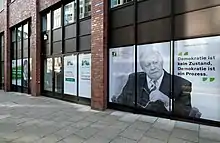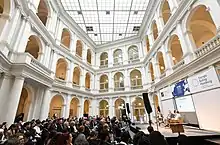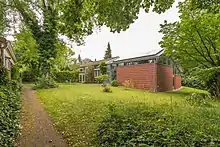Federal Chancellor Helmut Schmidt Foundation
The Federal Chancellor Helmut Schmidt Foundation (German: Bundeskanzler-Helmut-Schmidt-Stiftung, Abbr. BKHS) is the most recent of the six non-partisan foundations commemorating politicians in Germany.[1] It was established on 1 January 2017 by the German Bundestag to “preserve the memory of Helmut Schmidt’s political work for the freedom and unity of the German people, for European freedom and unification and for understanding and reconciliation among nations”.[2] Within the framework of its political education work, it is also tasked with conveying to young people in particular those topics that exercised Schmidt as a politician and journalist.
Bundeskanzler-Helmut-Schmidt-Stiftung | |
 | |
| Abbreviation | BKHS |
|---|---|
| Named after | Helmut Schmidt |
| Established | January 1, 2017 |
| Legal status | Foundation of public law |
| Purpose | Preserving the memory of Helmut Schmidt’s political work; political education |
| Location |
|
Chairman | Meik Woyke |
Trustees | Peer Steinbrück (Chair) Susanne Schmidt (Deputy) |
Staff | 16 |
| Website | helmut-schmidt |
The foundation has its headquarters in central Hamburg and a branch office in Schmidt's former home in the Langenhorn district of the city, where the private Helmut Schmidt Archives are also located.[3]
Organisation

The BKHS is a foundation in public law under direct federal government control. It is funded by grants from the federal budget and is subject to legal supervision by the Federal Government Commissioner for Culture and the Media (BKM).
The bodies of the foundation are the Board of Trustees, whose members are appointed for a period of five years by the Federal President, and the Management Board appointed by the Trustees. The Board of Trustees currently comprises Peer Steinbrück (Chair), Susanne Schmidt (Deputy Chair), Dirk Fischer, Johannes Kahrs, Giovanni di Lorenzo and Sandra Maischberger.[4]
The historian Meik Woyke has been Chairman of the Management Board and Managing Director since 1 July 2019.[5] Further, honorary members of the board are Hans-Gerhard Husung and Bernd Neuendorf.[4] From 2017 to 2019, Stefan Herms and Knut Nevermann managed the foundation's business as honorary board members.
Tasks

According to the law establishing it, the foundation shall
- make a contribution to the understanding of contemporary history and the continued development of the Federal Republic of Germany and
- to the reappraisal, presentation and further development of Germany's responsibilities in foreign, security and economic policy in a European and global setting.
- It shall also contribute to deepening and broadening knowledge of 21st century geopolitical and economic challenges in Europe and the world.[2]
In addition to the historical work, there are three sub-programmes: “European and International Politics”, “Global Markets and Social Justice” and “Democracy and Society”.[6] They take up thematic impulses in Helmut Schmidt's life and address current political issues. A particular focus is on the future of transatlantic relations: In this regard, the foundation has already staged several symposiums[7] and, in cooperation with the German Marshall Fund, established a high-ranking commission of experts charged with making recommendations by the autumn of 2020.[8] This "Transatlantic Task Force"[9] includes European and US experts such as Catherine Ashton, Cecilia Malmström, Will Hurd, Elissa Slotkin, Henrik Enderlein, or Michael Froman. It is chaired by President of the German Marshall Fund Karen Donfried and German diplomat Wolfgang Ischinger.
The foundation works closely with the private Helmut and Loki Schmidt Foundation (HLS), established in 1992, and also on archive matters with the Friedrich Ebert Foundation and the German Federal Archives.
Locations
Helmut Schmidt Forum
At its headquarters in central Hamburg, the foundation maintains the Helmut Schmidt Forum, where exhibitions and guided tours are offered as well as regular readings, lectures and discussions. On 7 December 2018, the first exhibition, “100 years in 100 days” opened, showing one image for each year of the former Chancellor's life, including some previously unpublished photographs, up until the end of March 2020. After a break for alterations, a new permanent exhibition will be shown here from 10 November 2020 onwards.[10]
House in Langenhorn

In December 1961, Helmut and Loki Schmidt and their daughter Susanne moved into a house in the Langenhorn district of Hamburg. Here, Helmut Schmidt played host to friends, politicians and artists. His guests included Valéry Giscard d’Estaing, Henry Kissinger, Juan Carlos I of Spain, Leonid Brezhnev, Oskar Kokoschka and the members of the “Friday Society” that Schmidt founded.[11][12]
After Schmidt's death on 10 November 2015, the private Helmut and Loki Schmidt Foundation (HLS), established back in 1992, inherited the property from the couple with the task of preserving it as an authentic historical site. Due to space constraints, guided tours here are only possible to a limited extent. They are offered exclusively through the BKHS.[13]
Helmut Schmidt Archives

Also in Langenhorn are the Helmut Schmidt Archives that house the private papers of Helmut and Loki Schmidt and their close friend Karl Wilhelm Berkhan.[14] They comprise more than 3,500 individual documents, 284 photo albums and a comprehensive library. Schmidt had already had a small library built in 1978, and in 1992 the couple acquired the semi-detached house next door to house the archives. In 2006/7 a further annexe was added. Since then the bequests have been housed in a separate storeroom.
The archives also belong to the private Helmut and Loki Schmidt Foundation. BKHS staff work to index and record the bequests stored here, thus creating the conditions for their public use.
References
- "Politikergedenkstiftungen – Die Politikergedenkstiftungen des Bundes" (in German). Retrieved 2020-07-06.
- "Bundesgesetzblatt" (PDF). www.bgbl.de. Retrieved 2020-04-24.
- "Helmut Schmidt Archives". Bundeskanzler Helmut Schmidt Stiftung. Retrieved 2020-07-06.
- "Organization". Bundeskanzler Helmut Schmidt Stiftung. Retrieved 2020-04-24.
- "Dr. Meik Woyke wird Vorstandsvorsitzender und Geschäftsführer". www.helmut-schmidt.de (in German). Retrieved 2020-04-24.
- "Global markets and social justice". Bundeskanzler Helmut Schmidt Stiftung. Retrieved 2020-04-24.
- "FOTAR2020: The Transatlantic Security Partnership in Turbulent Times". www.helmut-schmidt.de. Retrieved 2020-04-24.
- "The German Marshall Fund and Bundeskanzler-Helmut-Schmidt-Stiftung Launch "Transatlantic Task Force" Setting Path Forward for U.S.-Europe Relations". www.helmut-schmidt.de. Retrieved 2020-04-24.
- "Alienation or cooperation? The COVID-19 pandemic and ideas for the transatlantic partnership". www.helmut-schmidt.de. Retrieved 2020-07-06.
- Werner, Jana (2019-12-18). ""Die Menschen lieben Schmidt nach wie vor"". DIE WELT. Retrieved 2020-04-24.
- Hansjörg Müller, Hamburg. "Helmut Schmidts Wohnhaus in Hamburg erlebt einen Besucheransturm". Neue Zürcher Zeitung (in German). Retrieved 2020-04-24.
- Wunder, Olaf (2018-12-22). "Brandt und Breschnew waren zu Besuch: So wurde Schmidts Bungalow zur Legende". MOPO.de (in German). Retrieved 2020-04-24.
- "Für kleine Besuchergruppen: Legendärer Schmidt-Bungalow öffnet am Freitag seine Türen". MOPO.de (in German). 2019-04-04. Retrieved 2020-04-24.
- "Helmut Schmidt Archives". Bundeskanzler Helmut Schmidt Stiftung. Retrieved 2020-07-06.
External links
| Wikimedia Commons has media related to Bundeskanzler-Helmut-Schmidt-Stiftung. |